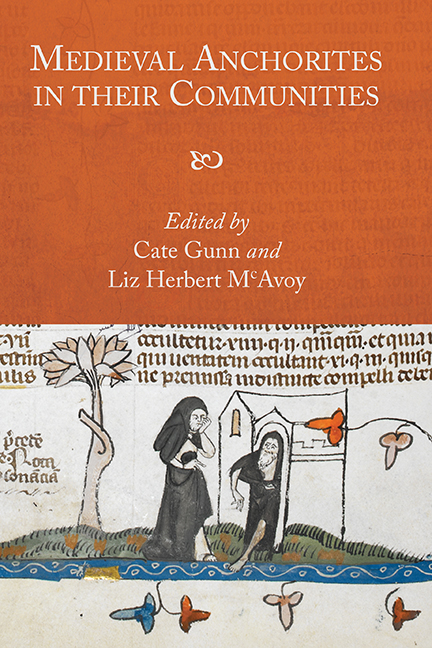Book contents
- Frontmatter
- Dedication
- Contents
- List of Illustrations
- Acknowledgements
- List of Contributors
- Abbreviations
- Introduction: ‘No Such Thing as Society?’ Solitude in Community
- 1 ‘O Sely Ankir!’
- Part I Religious Communities
- Part II Lay Communities
- Part III Textual Communities
- 10 Anchoritic Textual Communities and the Wooing Group Prayers
- 11 The Anchoress Transformed: On wel swuðe god ureisun of God almihti and þe wohunge of ure lauerd in the Fourteenth-Century A Talkyng of the Love of God
- 12 Ancrene Wisse and the Egerton Hours
- Bibliography
- Index
- Miscellaneous Endmatter
11 - The Anchoress Transformed: On wel swuðe god ureisun of God almihti and þe wohunge of ure lauerd in the Fourteenth-Century A Talkyng of the Love of God
from Part III - Textual Communities
Published online by Cambridge University Press: 30 August 2017
- Frontmatter
- Dedication
- Contents
- List of Illustrations
- Acknowledgements
- List of Contributors
- Abbreviations
- Introduction: ‘No Such Thing as Society?’ Solitude in Community
- 1 ‘O Sely Ankir!’
- Part I Religious Communities
- Part II Lay Communities
- Part III Textual Communities
- 10 Anchoritic Textual Communities and the Wooing Group Prayers
- 11 The Anchoress Transformed: On wel swuðe god ureisun of God almihti and þe wohunge of ure lauerd in the Fourteenth-Century A Talkyng of the Love of God
- 12 Ancrene Wisse and the Egerton Hours
- Bibliography
- Index
- Miscellaneous Endmatter
Summary
THE fourteenth-century compilation A Talkyng of the Love of God (hereafter A Talkyng) is an excellent example of the incorporation of two texts from the ‘Wooing Group’ – On wel swuðe god ureisun of God almihti (hereafter Ureisun of god almihti) and þe wohunge of ure lauerd (hereafter Wohunge) – in a new textual and social context. Ureisun of god almihti, Wohunge and the related text Ancrene Wisse, associated by dialect and manuscript tradition, were originally written for anchoresses in the West Midlands in the thirteenth century. Both Wohunge and Ancrene Wisse are specifically addressed to anchoresses, but these texts nevertheless quickly passed into the hands of a wider group of readers.
A Talkyng is included in the closely related fourteenth-century Vernon and Simeon anthologies. MS Bodleian Eng. Poet. a.1 (The Vernon Manuscript) contains the complete text, but in MS British Library Add. 22283 (The Simeon Manuscript) the beginning and end of A Talkyng are missing. Both Ryan Perry and Wendy Scase have demonstrated that the texts in the Vernon manuscript were thoughtfully edited and revised, and this leaves the question open as to whether possible versions other than the Vernon and Simeon copies of A Talkyng might have been substantially different.
In addition to the anchoritic source material from the ‘Wooing Group’, A Talkyng is made up of a translation and free rendering of parts of some of Saint Anselm's (d. 1109) ‘Prayers and Meditations’. Anselm's texts in fact already underlie the thirteenth-century anchoritic texts, and Wohunge in particular. This text incorporates the Anselmian confession of the sinful soul, its tone of impassioned prayer and exclamation, and the idea of withdrawal into the chamber of the heart. Anselm's texts were still very much in vogue in the fourteenth century, both in Latin, but also in Middle English translations. Both the Vernon and the Simeon manuscripts also contained Middle English versions of Anselm's meditations. There is a Middle English translation of Anselm's second meditation in the Simeon Manuscript, but unfortunately the translation that is announced in the fifteenth-century index of the Vernon Manuscript, under the title ‘Orisons off seynt Anselmes Meditaciouns’, is absent in the Vernon manuscript due to a loss of forty leaves.
- Type
- Chapter
- Information
- Medieval Anchorites in their Communities , pp. 183 - 198Publisher: Boydell & BrewerPrint publication year: 2017

